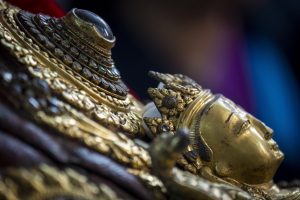Nepal’s gods and goddesses are returning home.
An unknown number of sacred statues of Hindu deities were stolen and smuggled abroad in the past. Now dozens are being repatriated to the Himalayan nation, part of a growing global effort to return such items to countries in Asia, Africa, and elsewhere.
Last month, four idols and masks of Hindu gods were returned to Nepal from the United States by museums and a private collector.
Among them was a 16th-century statue of Uma-Maheswora, an avatar of the gods Shiva and Parvati, that was stolen four decades ago. It was not clear who took it or how it ended up at the Brooklyn Museum in New York, which handed it over to the Manhattan District Attorney’s Office.
Devotees celebrated its return in Patan, south of the capital, Kathmandu. The stone-paved alleys were crowded with devotees offering money and flowers. Men in traditional attire played drums and cymbals and chanted prayers.
“I cannot say how extremely happy I am right now,” said Ram Maya Benjankar, a 52-year-old who said she had cried as a child after learning the statue had been stolen and waited years for its return.
The statue had simply disappeared from their neighborhood, she said.
The majority of Nepal’s 29 million people are Hindu, and every neighborhood has a temple that houses such items. They are rarely guarded, making it easy for thieves.
For Nepalis, the idols have religious significance but no monetary value. For smugglers, however, they can bring huge value abroad. For years, there was little attention given to the thefts or any effort made at recovery.
That has changed in recent years as the government, art lovers, and campaigners pursue stolen heritage items. They have been successful in many cases.
A group representing the ethnic Newar community from Nepal in the United States heard about the reappearance of the Uma-Maheswora statue at the Brooklyn Museum and took the initiative to bring it home.
“We were very sad to see that our gods were locked in the basement. We were then determined that we need to take back the heritage,” said Bijaya Man Singh, a member of the group that carried the four idols and masks back to Nepal.
Now the temple in Patan is being prepared to reinstate the Uma-Maheswora statue. Following the welcome ceremony, it was placed on a chariot carried by devotees and taken to a museum, where it will be kept under security until its final move.
More than 20 other stolen artifacts are in the pipeline to be repatriated to Nepal soon, according to Jayaram Shrestha, director at the National Museum in Kathmandu. Most will return from the United States and Europe.
Shrestha has built a special room to exhibit repatriated items so the public can come and worship if they want. There are currently 62 statues on display.
“As we expect many to come soon, we are expanding the section of the museum,” Shrestha said. “I don’t want to store them in storage. They should be made available.”
It has become easier to locate stolen items as awareness grows among Nepalis at home and abroad. They can now track artifacts online when they are exhibited or put up for auction.
And more collectors and museums now believe they should be taken back to where they belong, Shrestha said.
“The Nepal government has been taking initiative to get them back with recovery campaigns and using diplomatic channels, embassies in foreign countries,” he said.
“We have made it clear that they need to be reinstated to their original place and security ensured to keep these thousands-of-years-old artifacts safe,” said Nepal’s foreign minister, Narayan Prakash Saud.

































